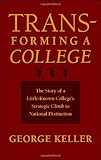 Transforming a College: The Story of a Little-Known College’s Strategic Climb to National Distinction is both an interesting and insightful case study about Elon College (now Elon University), which rose from relative obscurity and ordinary status in the 1970s to become, according to many, among the country’s finer institutions for student-oriented undergraduate education.
Transforming a College: The Story of a Little-Known College’s Strategic Climb to National Distinction is both an interesting and insightful case study about Elon College (now Elon University), which rose from relative obscurity and ordinary status in the 1970s to become, according to many, among the country’s finer institutions for student-oriented undergraduate education.
The late George Keller tells Elon’s story by examining the decisions made by Elon administration and trustees over the course of two presidencies. It’s a short and worthwhile read. Keller concludes with his “analysis of ascent” – the six most important features that propelled the college forward:
1. Mantra of “quality everywhere”
Elon’s former president Fred Young, who led the school from 1973 until 1997, clearly understood that everything mattered, and he wanted every aspect of Elon’s operations to be excellent – every event on campus, every class of instruction, every telephone response, etc. “We try to exceed parent and student expectations at every step of the process,” according to one admissions officer. I have never visited Elon, but it sounds like a beautiful campus. Elon worked diligently over the years to enhance the appearance of the campus – a major handicap in attracting students decades ago, but now a major asset.
2. Addiction to planning
While strategic planning and goal-setting are not unique, what set Elon apart was its success communicating widely its goals and vision and steadfastly ensuring that strategies were carried out. Elon created a culture of inclusiveness, involving all levels of the campus community in leadership meetings and planning sessions. Its “remarkably transparent” budgeting process educated all employees about how much was being spent and how and why it was being spent. Strategic plans often become mere paper proposals; not so at Elon.
3. Attention to the selection, training, and rewarding of people
Elon’s administration recognized that higher education is largely a people business. The school considered hiring new faculty and staff members to be the most critical decisions made at the institution.
4. Willingness to create a distinctive niche in the crowded firmament of American colleges and universities
Elon strategically identified the type of institution it wanted to be, the type of student it wanted to attract, and its competitive advantages. Elon excelled at experience marketing, meticulously ensuring that the college delivered on its brand promise of “engaged learning.”
5. Acumen about financing growth with relatively small amounts of its own money
The college borrowed huge sums of money to build state-of-the-art facilities and deliver on its ambitions. This exemplifies the most impressive element of Elon’s success story in my opinion: “the administration and trustees boldly designed their future.” Is your institution risk averse? Elon took daring leaps forward. Former president Young repeatedly told the faculty and staff that “a fine institution is never static.”
6. Recent skill at marketing
The book describes Elon’s heavy investment in admissions staff and materials in recent years. However, the emphasis on student recruitment dates back to President Young. One of his colleagues said, “Fred was an absolute nut about the importance of admissions, retention, and marketing. He never let anyone forget that.” Enrollment was his top priority when he came to Elon, and today the main admissions office is still next to the president’s office.
I think there’s no work more exhilarating in higher ed than being a part of transformational change. I’ve been lucky enough to experience this at my current institution and have observed many similarities, including a laserlike focus on student growth, bold leadership, spending money to make money, and transparency (as well as the addition of intercollegiate athletics and a mascot change).
The book is not intended to be a recipe for success. Rather, Keller hoped that others would draw inspiration from Elon’s ascent. His words written in 2004 are just as true today, if not more so: “America has never needed as many highly educated, creative, spirited persons as it does today.”




